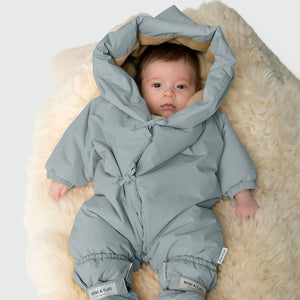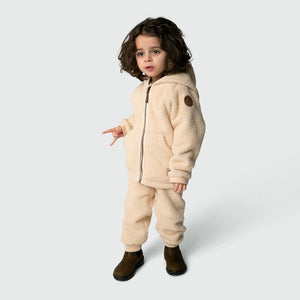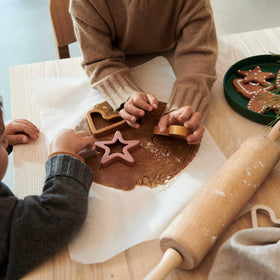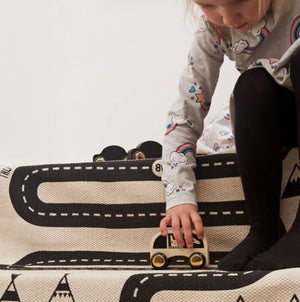
First weeks with baby: 8 tips for caring for your newborn
Becoming a mother for the first time: ouatch! What a joy and at the same time what an overwhelming experience! While meeting, holding and loving your adorable little girl or boy is the experience of a lifetime, there is another aspect that moms are just beginning to openly discuss...
Your body has just gone through an intense (and painful) experience, and you're still feeling the aftershocks of childbirth and labor: blood loss, pain, exhaustion, and while you're recovering, you're dealing with a new human. Luckily, we have some tips for new moms entering this uncharted, messy, life-changing (let's just say it) territory
1. Ask for help wherever you can
You may have been told this over and over and over again but: get help! Your body is postpartum and slowly recovering. You need to take care of yourself as well as your baby. Your mental and physical health is also essential. If you are fortunate enough to have people in your life who you trust and who are willing to help you, accept the hands that are extended.
Also remember to communicate with your partner, perhaps more regularly than necessary. Ask him or her to change and hold the baby while you eat breakfast and shower, set up a nightly feeding schedule if you use a bottle, or give him or her the responsibility of feeding you.
- You can also turn to experts such as:
- A lactation consultant;
- A postpartum doula;
- A nurse or home health aide.
In the real world, we know that some moms don't have anyone to turn to, and it's incredibly difficult. In this case, online communities can help, but make sure you join one that is truly supportive. And don't compare yourself!
2. Ensure the health and safety of the newborn
Newborns can seem incredibly small and fragile, especially if you don't have much experience with a baby. Here are a few things to consider when you bring your little one home:
- Before you or anyone else holds your baby, wash your hands or use hand sanitizer. Babies can't be vaccinated against COVID-19, so it's a good idea to be careful. (If you have a cough or respiratory infection, ask to wear a mask!)
- Babies can't hold their heads upright for the first few months of life, so support their heads and necks whenever you hold them or when you lay them down on their changing table, for example.
- Don't shake your baby to play or when they are frustrated. Shaking a baby can cause irreversible brain damage and even death. If you feel exhausted and about to shake your baby, put him or her in a safe place, such as a crib or swing, and go to another room for a few minutes to breathe or cool off. If you know someone who can take over for a while, call them.
- Make sure your car seat is properly installed a few weeks before your due date. Here's where you can go to have your car seat checked by a technician.
- Make sure your child is always secure in his or her car seat or stroller
3. Change your baby's diapers like a pro
Your newborn will use about 8-10 diapers a day, which means you'll need to change up to 70 diapers a week. To make it easier, set up a changing station in his room, the bathroom or both. Here are your essentials:
- Cloth or disposable diapers;
- Wipes;
- Diaper cream.
Some babies are more prone to diaper rash than others. To avoid a rash, try to:
- Change the diaper after each bowel movement or every two hours or so ;
- Use a fragrance-free laundry detergent for cloth diapers and be aware of the ingredients in disposable diapers;
- Allow your baby's genitals to be aired whenever possible;
- Clean the area with a damp washcloth and mild soap before applying a thick layer of cream recommended by your pediatrician;
- Call your pediatrician if the rash doesn't show signs of improvement after three days.
More diaper changing tips:
- Got a little boy? Be prepared for him to pee on you - it happens faster than you think!
- Always wipe your little girl from front to back to prevent urinary tract infections.
- Don't just buy a small amount of newborn diapers - babies grow faster than you think! There are also diaper delivery services (that have the perfect composition). It helps take the mental load off and it's really convenient!
4. Soothe your baby with these tips
Babies cry an average of two hours a day... Sometimes you may feel like a failure if you can't calm them down, but that's not the case. Here are some tips to try:
- Wrap your baby comfortably in a swaddling blanket. Some babies like the comfort of swaddling, and it protects them from their natural startle reflex that often wakes them up. Swaddling also prevents them from accidentally scratching or scratching themselves.
- Play soft music or white noise to help create a calm environment for both of them.
- Avoid harsh lighting. Having nightlights, soft lamps and blackout curtains can be easier on a baby's eyes.
- Give your baby a gentle massage. This promotes bonding and relaxation.
- Try skin-to-skin with your baby. Skin-to-skin contact is incredibly beneficial for both baby and parent.
Muslin swaddles - Konges Slodj
5. Give your baby a gentle bath
Bathing your newborn for the first time can be a challenge after you give birth. Don't be afraid to ask your partner to participate. Fortunately, your baby doesn't need a full bath until his or her umbilical cord falls off - about two weeks after birth. For a cozy cleanup, you'll need:
- A sink or bowl of warm water with a few drops of non-toxic shower gel;
- A washcloth;
- A hooded towel.
Sylvester washcloth - safari mix - Liewood
Hooded Towel - Life Aquatic - Pehr
When it is ready for a full bath, you will need :
- A baby bathtub;
- A bath thermometer (if you have one);
- A washcloth;
- A non-toxic shower gel/shampoo;
- A hooded towel.
More bathing tips:
- Bathe your little one in a room heated to about 75° F (23° C);
- You only need two to three inches of water (between 5 and 10 cm) in the baby bathtub;
- Always test the water temperature with a bath thermometer or your elbow. It should be about 100° F (37° C), which will not be too hot or too cold to touch.
Silicone bath thermometer - Konges Slodj
6. Take good care of the umbilical cord
The umbilical cord usually falls off about two weeks after birth. To care for it, let it fall off on its own and see your doctor if it stays on for more than three weeks, oozes pus or is swollen and red. Do not put the umbilical cord in water.
Nurses at your hospital or birth center will probably give you alcohol wipes to clean the area daily, although some doctors don't think this is necessary. Some doctors recommend simply cleaning the area once a day with a sterile compress and neutral soap and then drying it well. Others suggest doing nothing and waiting for the cord to fall off by itself. When in doubt, ask your baby's health care professional what their preference is.
7. Find out all about bleeding
You may be one of those moms who already know before you give birth whether you want to breastfeed your baby or not. Either way, be prepared to be flexible. There are many reasons why breastfeeding doesn't work, but keep in mind that the combination of breastfeeding and formula will result in a healthy baby (and that's what we want, right?). While many moms feel pressure to breastfeed from social media and health professionals, remember that the most important thing is that he eats - no matter what you choose.
Breastfeeding for new moms can be incredibly difficult, but if it calls to you, it can be very rewarding and beautiful. If you know it's not right for you and your baby, you don't need anyone's permission to make your choice.
Depending on your preference, you may need:
- A minimum of four bottles;
- A breast pump;
- A breastfeeding pillow;
- Nipple cream or ointment;
- Milk storage bags;
- Formula.
Nursing pillow - Polar Bear - Nanami
More tips on the drinking schedule:
- Most newborns feed on demand and at least every 2/3 hours. Your baby should nurse for about 10-15 minutes at each breast or take 2-3 ounces (60-90 ml) from a bottle;
- Some newborns need to be awake to feed, while others will want to feed 24 hours a day - both are normal!
- All formulas should meet the same nutritional standards, and you may need to try a few to see which one will work best for your baby's stomach.
- Breastfeeding can be stressful for new moms because you don't know how much milk your baby is drinking. Rest assured, if they have wet, dirty diapers, are gaining weight and your breasts seem less full after feeding, then you're on the right track.
Burping Tips:
- Newborns are often "fussy" because of the air they swallow while eating. Remember to burp your baby before changing breasts or after every two ounces (60 ml).
- Keep your baby upright when burping. Try holding your baby in your lap with your hand under his chin to support his head. You can also rest her head on your shoulder by patting her back with one hand and supporting her head with the other.
- Be patient. Sometimes it takes a while to get a good burp, but it's worth it to avoid discomfort later.
- Use a bib to minimize damage.
8. Take care of your sleep
Unfortunately, this has become an extremely controversial topic that can quickly become annoying. Co-sleeping, sleep training methods, etc. It's all the rage. Whether you're considering sleeping with your little one, trying a sleep training technique or somewhere in between, always do what's best for you and your baby. Here are a few things to consider, though:
- Be sure to put your baby down in a safe space, whether it's a crib in your room, a cradle in their room or co-sleeping.
- For newborns, routine is not yet essential. Some babies naturally have predictable routines, while other babies don't. If you feel like it, you can still establish a bedtime and naptime routine.
- Every newborn is different, but don't expect to sleep through the night without waking up immediately. It's perfectly normal (and even healthy) for him to wake up every 2-4 hours - some babies may wake up more often than that.
- To prevent sudden infant death syndrome (SIDS), have your baby sleep swaddled on his or her back in the crib, keep the temperature between 68 and 72°F (20 and 22°C) and don't keep blankets, stuffed animals or toys in the crib. Having a smoke-free home also helps prevent SIDS.
Keep in mind that our entry into motherhood is different for each of us, and that's the beauty of it! You may have just adopted, had twins, or your baby is in the neonatal intensive care unit (NICU); maybe you can't or won't breastfeed, or even you're a single parent. Take the advice that fits your unique experience and leave the rest.
Always remember to ask for help (if possible) from a postpartum doula, friend, relative or partner. Try to stay connected with yourself to detect the symptoms of postpartum depression should it arise and communicate openly and honestly with your partner so that he or she can best support you.
Finally, don't underestimate the preparation! Whether it's visiting the hospital, preparing baby supplies, or reading about everything that's in store for you










